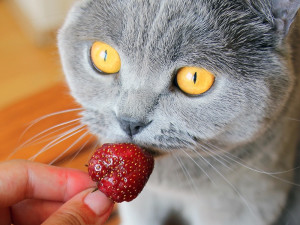Can Dogs Eat Cherries?
Find out if the yummy fruit is safe to share.

Share Article
Life may be a bowl of cherries, but can you share them with your favorite pup? Yes, you can. As long as you offer them in moderation and keep a few words of wisdom in mind, your dog can enjoy the occasional cherry for a snack.
Cherries are not only sweet and delicious but contain many important nutrients, some of which can benefit your dog as well. Read on to learn all about sharing cherries with your pup.
Nutrition facts about cherries for dogs
Cherries are fruits that grow on trees of the Prunus genus, which also includes other fruits like plums, peaches, pears, and apricots. There are at least 32 known varietiesopens in new tab of cherries, including a few that grow wild. The most common cherries available commercially include sweet cherries like Bing cherries and tart cherries, like Montmorency cherries.
Cherries are often touted as a superfood for being little nutritional powerhouses. Some of their best benefits include their high fiber content, vitamins like A, C, and E, potent antioxidants, important minerals, and even melatonin, which promotes quality sleep. Many of these nutrients can also benefit your pup. Because cherries are also high in sugar, they should only be offered as the occasional treat.

Are cherries good for dogs?
Cherries can provide valuable nutrients to dogs; however, they are also high in sugar and should only be shared occasionally. Because dogs have specific nutritional requirements, they need to get the bulk of their diet from a complete and balanced dog food diet. If they are eating a balanced diet, they will be getting adequate amounts of all the necessary vitamins, minerals, and other nutrients that they need to be strong and healthy. Any potential benefits from treats and table scraps are really just an added bonus. Some of the benefits that cherries provide include:
Minerals: Cherries contain potassium, magnesium, iron, and calcium, all of which are critical minerals for daily function. These minerals play a role in many different biological processes including muscle function, heart health, blood pressure regulation, bone health, and normal production and function of red blood cells.
Vitamins: Cherries also provide vitamins A, C, and E. While dogs do not need to get vitamin C from their diet, they can benefit from vitamin A which is important for eye health along with healthy bones and white blood cells. They also need vitamin E, which is a potent antioxidant.
Fiber: Cherries contain both soluble and insoluble fiber. These carbohydrates are not digested but help to prevent constipation, provide important nutrients to the gut microbiome, bulk up the stool, and create feelings of fullness.
Antioxidants: Cherries are a great source of antioxidants. They contain compounds like anthocyanins and flavonoids, which work to prevent cell damage from free radicals and may be protective against certain diseases like cancer, heart disease, diabetes, and some effects of aging.
Melatonin: Interestingly, cherries also contain melatoninopens in new tab, which is sometimes used as a supplement to promote restful sleep and to reduce anxiety. Melatonin does have an effect on dogs as well as humans.
Can dogs eat whole cherries?
Dogs should not eat whole cherries for a number of reasons. First, like many fruits in the Prunus genus, their pits, leaves, and stems contain a toxic compound called amygdalin, a cyanogenic glycoside, which can cause cyanide poisoning in large amounts. The pits need to be chewed or ground up to release the toxin, so if a dog swallows one whole, it would not cause a problem. In most cases, dogs will not eat nearly enough to get sick, but it is a good idea to avoid pits as well as the other parts of the plant since these can also contain the toxin, especially if they are wilting.
Ingesting large amounts of cherry pits can also put dogs at risk for digestive upset and intestinal blockages if the pits cannot pass through the intestines, so this is yet another good reason to keep them out of reach. Plus, eating whole cherries, especially if they are firm and not completely ripe can be a choking hazard. If you do want to share the occasional cherry with your dog, remove the stems, leaves, and pits first and cut it into bite-sized pieces.
Are cherries completely safe for dogs?
The fruit of the cherry is safe for dogs in moderation. There are a few important points to keep in mind when considering sharing cherries with your dog:
High in fiber: Cherries contain lots of fiber, so if your dog is not used to eating a lot of fibrous foods, it is best to go slow and offer just a small amount at first. Too much fiber introduced suddenly can lead to digestive upset including bloating, diarrhea, and gas.
High sugar content: Because cherries contain a lot of sugar, they should only be offered as a small treat occasionally. Large amounts of sugar can lead to weight gain and related health problems including diabetes and arthritis. Prepared foods containing cherries often have even more sugar than the plain fruit, especially products like maraschino cherries and cherry pie filling, so be wary of these.
Cyanide toxicity: The leaves, stems, and pits of the fruit all contain a compound called amygdalin which can be converted to cyanide in the body. Luckily, dogs don’t usually ingest enough to get sick, but to be safe, only the fruit should be offered to dogs. Make sure to remove the pits first.
Tremorgenic mycotoxins: Moldy fruit can contain a toxic compound known as tremorgenic mycotoxinsopens in new tab, so be sure to discard any moldy or rotten fruit and keep it out of your dog’s reach. If you have a cherry tree on your property, keep them away from fruits that have fallen and are decaying on the ground.
The bottom line: Can dogs eat human food?
Dogs can, and frequently do, eat many of the same foods as us. It can be a fun way to spice up your dog’s diet — and small bits of human foods can be highly motivating treats during training sessions, too. It is always important to double check that any food you are considering sharing with them is safe and non-toxic to dogs as there are some common human foods that should never be shared.
Also, be sure to factor all treats and table scraps into your dog’s total caloric intake to avoid over-feeding and putting them at risk for weight gain and related health problems. Be sure that your dog gets the bulk of their diet from a complete and balanced dog food so that they receive all of the nutrients they really need and are not in danger of nutritional deficiencies, which can cause serious health problems.
Finally, try to use treats and table snacks as an opportunity to enforce the kinds of behaviors you want from your dog, like sitting and waiting on their mat or going to their crate instead of counter surfing and begging. The more you can reinforce good behaviors with fun and exciting rewards, the sooner they will learn what you want and expect, deepening your bond and building lasting trust.
Other foods that are good for dogs
Kale can be a healthy snack for dogs with lots of nutritional perks.
Sweet potatoes are also a delicious snack you can share.
Apples are another good choice for a satisfying crunchy snack.
Other foods that are dangerous
As much as dogs love cheese, this is one food to avoid in large amounts.
Grapes are toxic to dogs and should never be shared.
Avocados should also be avoided due to a toxin called persin.
FAQs (People also ask)
How many cherries can a dog eat?
All table snacks should be less than 10 percent of your dog’s diet. Start with just a small bite of cherry fruit since it is high in fiber and may cause digestive upset in large amounts.
Is it OK to give dogs cherries?
Yes, cherries are OK in small amounts. They have a lot of sugar so should only be used as an occasional treat.
Why do dogs like cherries?
Dogs may like the sweet taste and the juicy texture of the cherry fruit.
Can dogs eat cherries?
Yes, dogs can safely eat the fruit of the cherry, but the pit and stems should be removed first.
Are cherries good for dogs?
Cherries contain important nutrients, but they are high in sugar and are not good for dogs in large amounts.
Can dogs eat whole cherries?
Dogs should not eat whole cherries. The pits contain low levels of toxins and can also put them at risk for intestinal blockages.
References:
Tremorgenic Mycotoxicosis in Four Dogs From a Single Householdopens in new tab
North Carolina State Extension: Prunus aviumopens in new tab
Nutrients: A Review of the Health Benefits of Cherriesopens in new tab
Tasting Table: 32 Types of Cherries Explainedopens in new tab
Toxicology: A review of Cyanogenic Glycosides in Edible Plantsopens in new tab

Dr. Amy Fox, DVM
Amy Fox, DVM is a small animal veterinarian in New York City with over thirteen years of experience in a mixture of general practice, emergency medicine, and shelter medicine. A lifelong animal lover, Dr. Fox studied biology in college and then worked as a veterinary nurse before pursuing veterinary school at Cornell University. Her expertise includes surgery, dentistry, and management of chronic conditions, and she is interested in toxicology, pain management, nutrition, care of senior pets, and educational outreach. Dr. Fox also enjoys writing about veterinary medicine and teaching, and her work has previously appeared in Spruce Pets. In her free time, she loves to cook, garden, go for long runs, and hang out with her goofy mixed-breed dog May, who provides never ending comic relief!
Related articles
![Puppy eating a bowl of blueberries]()
10 Superfoods You Should Share With Your New Dog
From kale to quinoa, these nutrient-packed picks deserve a spot in your dog’s food bowl.
![Women in the kitchen baking mushroom pizza with her dog.]()
Can Dogs Eat Mushrooms?
Your dog is a fun-gi, but be careful which shrooms they eat.
Can Dogs Eat Cheese?
We know they want to — but how much is safe?
Can My Dog Eat Honey? Learn If Honey Is Beneficial or Harmful For Dogs
They shouldn’t exactly have their paw constantly in the honey jar, but the sweet stuff can be beneficial in some cases.
![Grey cat eats a strawberry]()
Can Cats Eat Strawberries
Yes, strawberries are a nutritious treat for dogs.
![a woman eats breakfast with pomegranate while her cat sits on her lap]()
Can Cats Eat Pomegranates?
Vets want them to steer clear. Here’s why.








